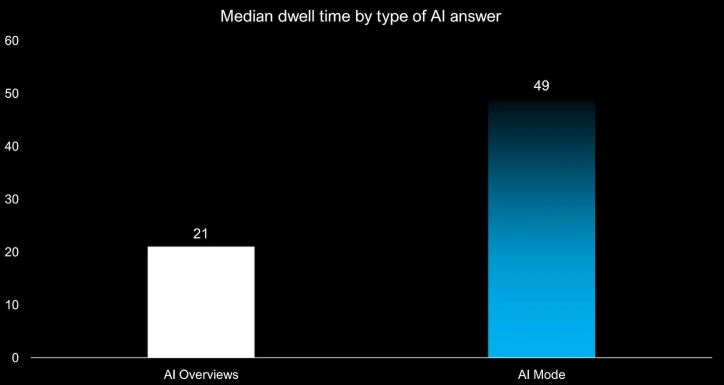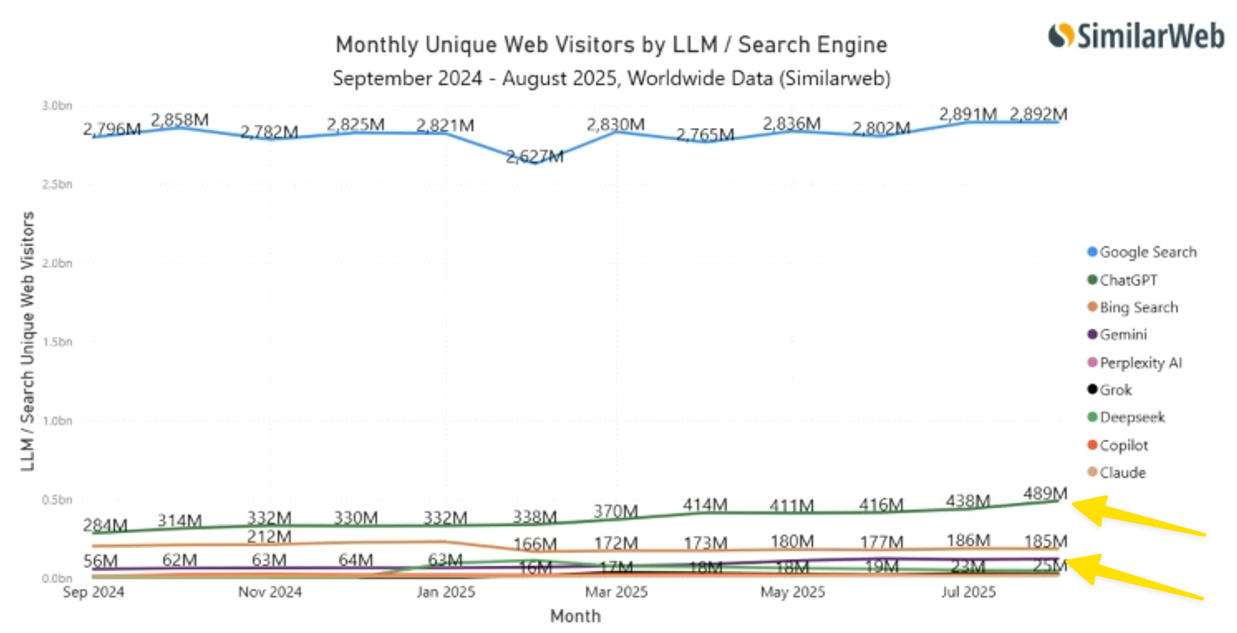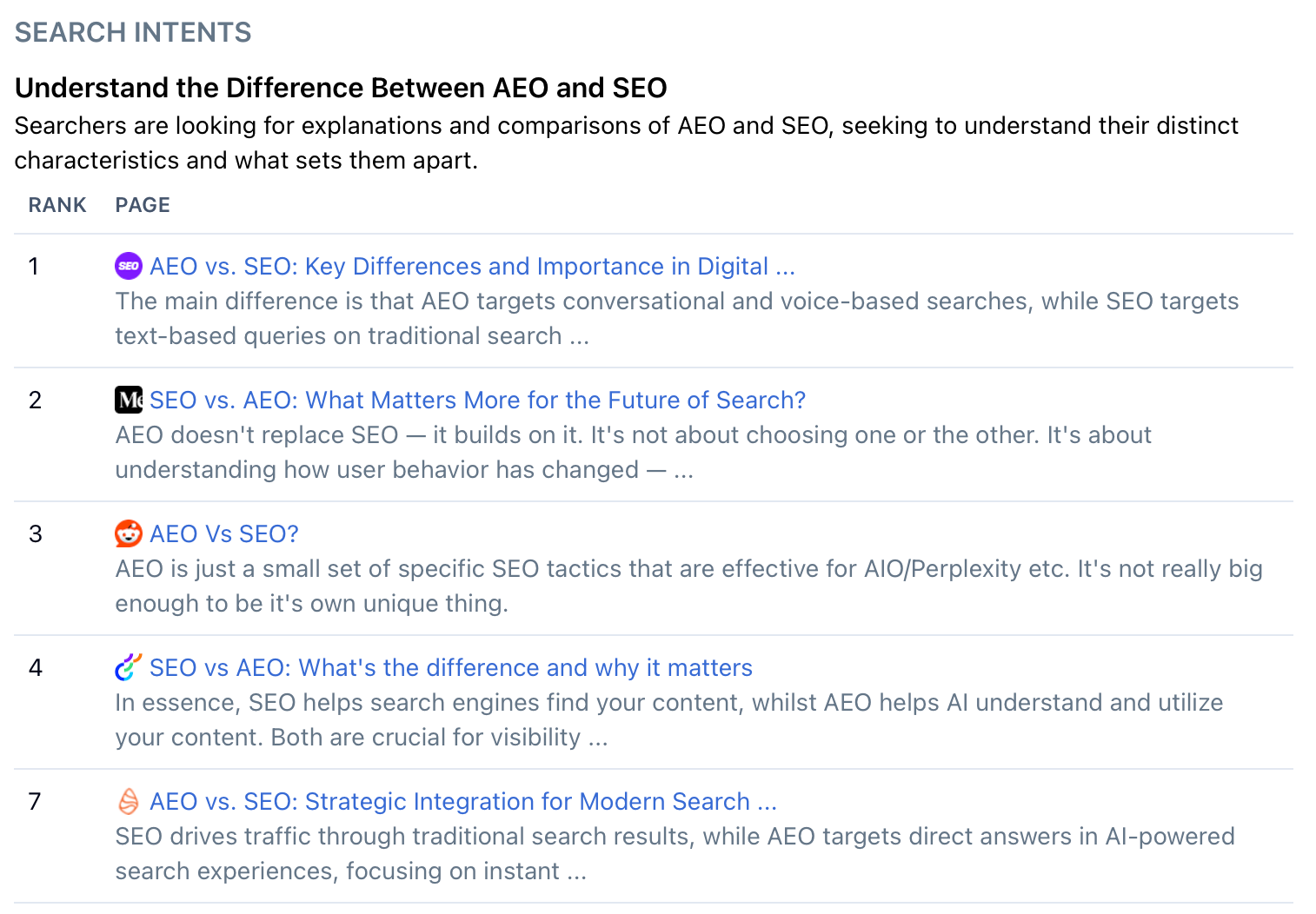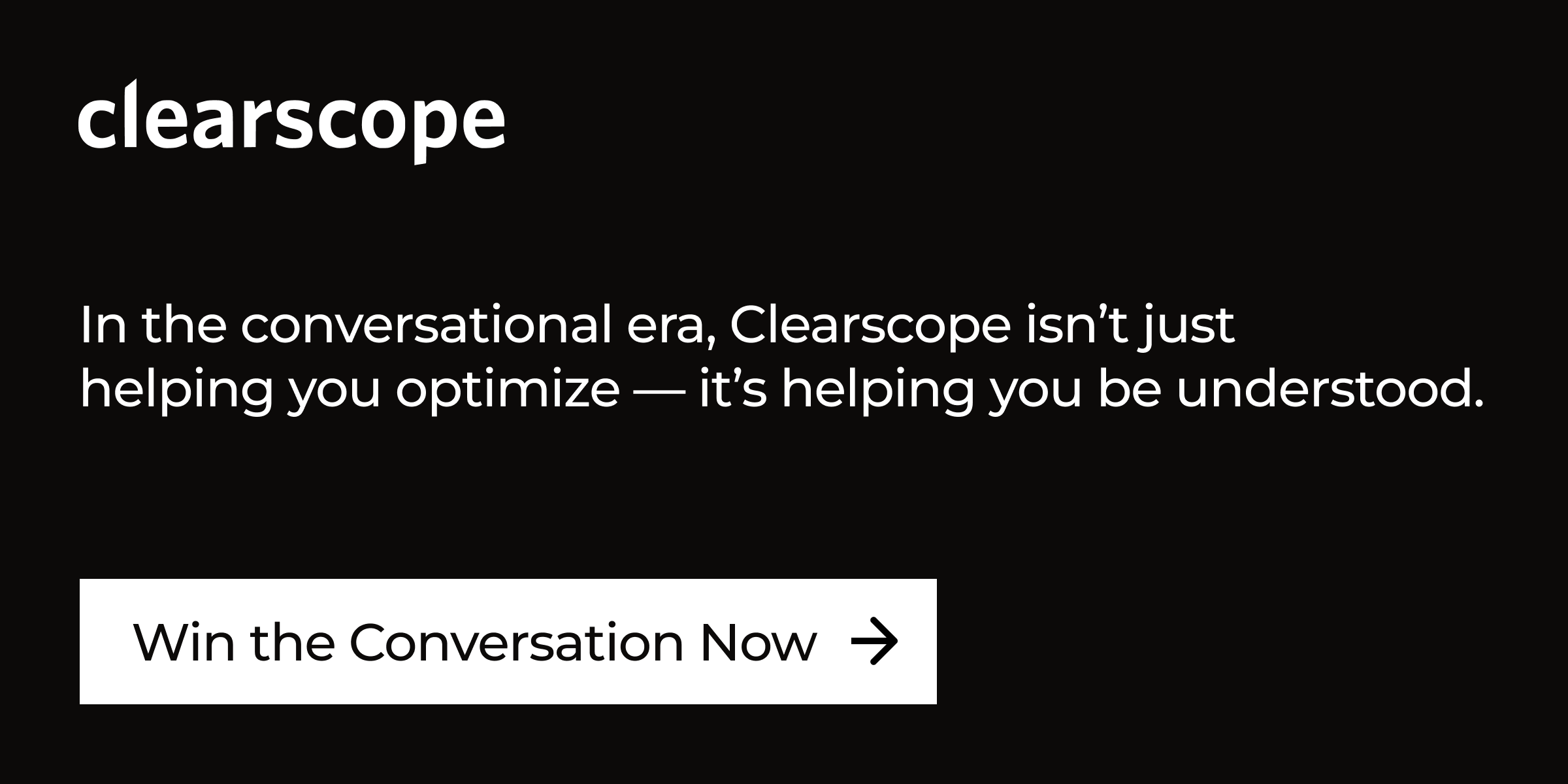The Future of SEO Is Conversational
Topic: Clearscope
Published:
Written by: Bernard Huang
Search is changing: not just in how it looks, but in what it means.
For years, visibility online was determined by where you ranked. Today, it’s determined by whether you’re referenced. AI answer engines like ChatGPT, Gemini, and Perplexity are teaching us something profound about discovery: people don’t want results; they want relationships with information.
They want answers that feel contextual, trustworthy, and human.
This is a new search paradigm — one where success in search depends on being understood by machines that can finally understand us back.
From Keywords to Conversations: The End of Search As We Know It
For the past twenty years, search has followed a predictable rhythm: a few keywords, a ranked list, a click. It was efficient, mechanical, and (at least for a while) reliable. The entire ecosystem of content and marketing was built around that exchange. But that model no longer reflects how people seek information or how information seeks them.
We’ve moved from typing to talking, from queries to questions. When users engage with systems like ChatGPT, Gemini, or Perplexity, they’re not scanning lists of blue links. They’re participating in an exchange: asking follow-ups, clarifying needs, refining until the answer feels right. Search is no longer a transaction; it’s a dialogue.
These systems aren’t replacing search engines so much as reshaping cognition itself. They’ve changed how we formulate questions, how we evaluate credibility, and even how we define discovery. The shift isn’t just technical—it’s psychological.
We’re no longer browsing information; we’re "talking" to it.

In this new environment, visibility is no longer about being clicked. It’s about being included in the conversation. In other words, participating in the underlying dialogue between users and intelligent systems that are learning, with remarkable accuracy, what people actually mean.
The Death of the Blue Link Era
The classic search results page—ten blue links surrounded by ads and snippets—was built for a web of pages, not a web of answers. It reflected an internet organized around retrieval: you searched, the algorithm fetched, and you decided which link to trust. It was a system optimized for information density, not understanding.
But that model no longer matches how people ask or expect to receive information. Today, users pose questions the way they would to a friend or a colleague. They want synthesis, not lists. They’re looking for reasoning, not rankings. And they want responses that contextualize, connect, and condense knowledge into something immediately useful.
As a result, algorithms are giving way to agents: intelligent systems that interpret meaning, learn preferences, and deliver information with context built in. We’ve moved beyond retrieval toward interpretation.
The “results page” has become a conversation space: one where answers evolve with every follow-up, and authority is measured by understanding, not by position.
How Conversation Is Redefining Discovery
Search is no longer a static act of retrieval. It has become a dynamic exchange between people and intelligent systems. What was once a simple exchange is now a continuous negotiation of meaning. Instead of directing users to information, these systems are beginning to mediate it, synthesizing context, authority, and relevance in real time.
This change is redefining discovery itself: what once was a ranking problem has become a comprehension problem.
Intent Becomes the New Index
Traditional SEO was built on matching keywords to content. Conversational search operates differently: it seeks to understand intent—the motivation behind a question and the path of reasoning that follows it.
In this new model, relevance isn’t just about containing the right words. It’s about anticipating the conversation those words belong to. When users ask nuanced or multi-part questions, AI systems don’t look for an exact match; they look for content that can guide the dialogue forward. In other words, content that predicts what someone will ask next and has already prepared the answer.
That shift changes what it means to demonstrate authority. In conversational search, expertise is defined by completeness. The more comprehensive and interconnected your coverage of a topic, the more confidently AI can map your perspective and use it to generate coherent answers.
Intent now rewards a body of work that behaves like human curiosity itself: expanding, connecting, and deepening over time. Each piece of content becomes part of a broader dialogue, one that grows more valuable as it anticipates the next question before it’s asked.
The Rise of Answer Engines
ChatGPT, and Gemini are fast becoming the new front doors to the internet.

These are now the places where users go for information. But here’s what’s changed: instead of ending their journey with a single answer, users are now going deeper. They’re exploring topics, asking follow-up questions, and seeking perspective.
In this new model, depth beats destination. Users don’t just want to know what something is; they want to understand why it matters and how it works. They’re looking for answers that reflect reasoning, not just retrieval.
That’s where the long long tail becomes essential — the specialized, high-context, lower-volume content that satisfies curiosity and builds trust over time. It’s not about chasing the highest-volume query; it’s about meeting users wherever their questions evolve next, and ensuring your brand is there with the answer.
Users don’t care who ranks first. They care which answer feels right and, more importantly, which one anticipates their next question. Mentions, citations, and contextual authority are replacing backlinks as the new measure of trust. And that trust is earned through depth, not density.
Citations and Mentions Are the New Rankings
If you’re mentioned or cited in AI answers, you exist. If you’re not, you’re invisible. Brand presence now depends on discoverability, not just traditional SEO metrics.
In the conversational era, visibility is earned through reference, not ranking. When an AI model cites your name, product, or research, it’s signaling that you’re part of the trusted conversation shaping its answers.
Over time, this becomes self-reinforcing: the brands most frequently cited today are the ones most likely to be remembered tomorrow. As models evolve toward closed-loop knowledge systems — drawing more from their internal “knowledge windows” than live web searches — the content they’ve already trusted becomes the foundation of future answers.
These mentions act as a new kind of backlink — not a hyperlink on a page, but a semantic vote of confidence embedded in the model’s understanding of the web. It’s no longer enough to own a keyword; you have to own a narrative.
The more your brand is quoted, paraphrased, or referenced across credible sources, the more visible you become inside generative systems. This shift redefines authority itself: it’s no longer measured in positions on a search results page, but in the frequency and quality of your inclusion in the world’s collective knowledge.
If you’re cited, you’re preserved. If you’re not, you risk irrelevance.
How to Win in the Conversational Era
The shift to conversational search doesn’t just change how people find information—it changes how brands need to think. Success now depends on demonstrating expertise that is deep, connected, and continuously visible to intelligent answer engines.
The challenge isn’t purely volume; it’s coherence. To stand out, brands must evolve from creating content for algorithms to building knowledge that teaches AI who they are.
Step 1: Own Topical Depth and Breadth
In the age of conversational search, surface-level coverage doesn’t cut it. AI systems look for patterns of expertise—consistent, in-depth content that signals true authority within a topic.
The more depth and breadth you build within a topic, the more confidently AI engines can cite you as a trusted source. Over time, those patterns form the semantic foundation of how your brand is represented inside generative answers.
Step 2: Optimize Content for Search Intent
Every question a user asks reveals intent: informational, transactional, or exploratory. The brands that win are the ones aligning their content to why people are searching, not just what they type.

This shift requires seeing content as part of a user’s evolving line of thought, not a standalone answer.
Step 3: Track Brand Visibility and Iterate
Visibility in conversational search is dynamic. As AI search engines evolve, so does the way they perceive and represent your brand. Tracking how, where, and when you’re mentioned across answer engines reveals which topics the models already associate you with and where you can strengthen your authority.
Iteration isn’t maintenance; it’s momentum. Each adjustment reinforces your signal, teaching AI to recognize your brand more confidently over time.
The New SEO: Answer Engine Optimization
The age of keywords is giving way to the age of answers. Search behavior is shifting—from scanning blue links to trusting AI-generated responses. In this new landscape, visibility isn’t just about being indexed; it’s about being included. That’s where Answer Engine Optimization (AEO) comes in.
From Search Engine Optimization to Answer Engine Optimization
Search isn’t ending — it’s evolving. The principles that shaped SEO still matter, but their context has changed. What used to be about ranking high on a results page is now about being found where it matters most: inside the answers that intelligent systems generate.
This next frontier is Answer Engine Optimization (AEO). It is a discipline focused on how your brand is represented within conversational engines. Instead of optimizing for clicks, you’re optimizing for inclusion: ensuring your expertise is recognized, cited, and trusted when AI systems construct meaning.
The Future Belongs to the Conversationally Intelligent
The winners of this new era won’t be the ones chasing every algorithm update. They’ll be the ones training AI to understand them. The brands that win will be those whose expertise is so consistent, connected, and credible that intelligent systems instinctively know where to turn.
In the age of AI-driven search, conversation has become the interface, and intelligence itself has become the new layer of optimization.
Those who learn to speak this language—clearly, contextually, and with authority—won’t just adapt to the future of search. They’ll define it.
The New Playbook for Discovery
The future of search isn’t about keywords — it’s about connection: between ideas, between people, and between intelligent systems that are finally learning to understand what we mean.
To win in this new era, brands need to:
Own their topical depth: building authority across the ideas that define them.
Optimize for intent: answering not just what people ask, but why they ask it.
Iterate through visibility: tracking where they’re mentioned, cited, and discovered, and strengthening those signals over time.
This is the new playbook for discoverability: a framework built on clarity, context, and credibility. It’s not just about adapting to AI. It’s about understanding how people, content, and intelligence connect in ways we’ve never seen before.

Write Blog Posts with AI (Without Losing Your Soul)
Turns out, you can write blog posts with AI without losing your unique voice. Discover smart ways to use AI as a writing assistant—not a replacement—for faster, higher-quality content creation.
Read moreThe AI SEO Revolution: 7 Ways to Future-Proof Your Organic Search
Discover 7 essential strategies to future-proof your SEO in the age of AI. From search intent to E-E-A-T and conversational content, learn how to stay visible and relevant in AI-powered search.
Read moreWhat Is AEO? + Why It’s the Next Big Thing in Search
What is AEO? Learn how Answer Engine Optimization helps your content appear in AI-generated answers across Google, Bing, ChatGPT, and more.
Read more